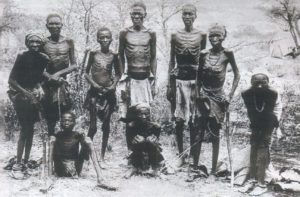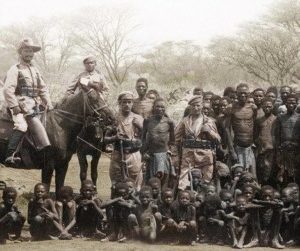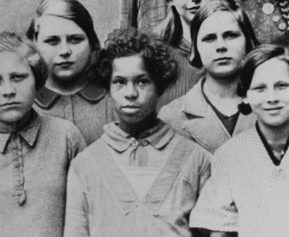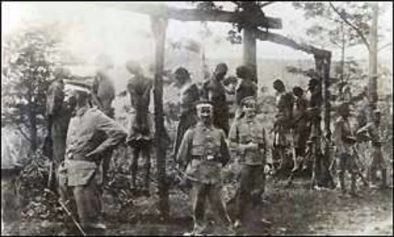
In a federal class-action lawsuit in New York, representatives of the Ovaherero and Nama people of Namibia have sued the Republic Germany for reparations in connection with colonial-era genocide in the former German South West Africa. More than 100,000 indigenous people were murdered, and while Germany has admitted to the atrocities, it has avoided paying reparations and sought dismissal of the case. (Photo: Wikimedia Commons)
A federal court in New York is the venue in which a colonial-era genocide of over a century ago is being adjudicated. Germany is being made to answer for its legacy of atrocities in the former colony of German South West Africa, now known as Namibia. Indigenous people in Namibia, descendants of the victims of genocide, filed a suit against Germany in federal court in New York, demanding reparations for the mass murder of more than 100,000 people, in what amounted to the beginning of the bureaucratized killing of the 20th century, and a precursor to European genocide of the Second World War.
The complaint (pdf) in the class action suit was filed in January 2017 on behalf of the Ovaherero and Nama peoples of Namibia “for damages resulting from the horrific genocide and unlawful taking of property in violation of international law by the German colonial authorities during the 1885 to 1909 period,” in what was then South West Africa. The complaint also reads that the purpose of the complaint is to “enjoin and restrain the Federal Republic of Germany from continuing to exclude plaintiffs and other lawful representatives of the Ovaherero and Nama people from participation in discussions and negotiations regarding the subject matter of this Complaint, in violation of plaintiffs’ rights under international law, including the UN Declaration on the Rights of Indigenous People to self-determination for all indigenous peoples and their right to participate and speak for themselves regarding all matters relating to the losses that they have suffered.” The Declaration was adopted by the UN General Assembly in 2007 with a majority of 144 states favoring the treaty, and four countries — Australia, Canada, New Zealand and the United States — opposing it.

Shark Island concentration camp, German South West Africa. (photo: clojudah.com)
As the plaintiffs make the case in their complaint, their communities suffered when more than a quarter of their land — 50,000 square miles — and the cattle that formed the basis of their survival were seized without compensation by the German colonists. Colonial authorities looked the other way during the “widespread and systematic rape” of Ovaherero and Nama women and girls, and the use of forced free labor.
After learning they would be sent to concentration camps and the rest of their land confiscated, the Ovaherero rose up in 1904, followed by the Nama the following year. “The uprising was crushed by German Imperial troops under the command of General Lothar von Trotha, who announced that his goal was to annihilate the Ovaherero people. His orders were effectively carried out, resulting in the deaths of over 100,000 Ovaherero and Nama, with the remainder thrown into concentration camps under atrocious and sub-human conditions, where there was an extraordinarily high death toll, and the survivors who were well enough to stand were forced to work as forced/slave laborer. The surviving women were subjected to systematic rape and other abuses,” read the complaint.
The victims say that Germany entered into negotiations with the Republic of Namibia after decades of denying the German imperial authorities had committed genocide and refusing to consider reparations and compensation. Then Germany excluded representatives from the Ovaherero and Nama peoples, those who were the victims of the atrocities, and refused to admit that its actions constituted genocide, even after condemning Turkey for its genocide by the Ottoman Empire against the Armenians in World War I. This suit, which seeks unspecified damages, was filed under the Alien Tort Claims Act, a 1789 law often used in human rights cases which grants jurisdiction to U.S. federal courts over “any civil action by an alien for a tort only, committed in violation of the law of nations or a treaty of the United States.” Last month, Germany — which has paid over $70 billion in reparations to the Jewish victims and survivors of the Holocaust by the Nazis — sought dismissal of the case by the Namibian victims of genocide. This, after ignoring the lawsuit, attempting to send back the court papers and claiming a violation of its sovereign immunity. Germany has acknowledged it committed the atrocities, but the nation has refused to pay reparations for the genocide, arguing instead that it has given millions of euros in development aid “for the benefit of all Namibians” since that country’s 1990 independence from South Africa.
Bill Fletcher, Jr., the former president of TransAfrica Forum, thinks the class action suit is very important. “What a lot of people don’t recognize is that the German genocide against native peoples in what is now known as Namibia is something historians have pointed to as a prototype for the Holocaust against the Jews,” Fletcher told Atlanta Black Star. Fletcher noted three things that are noteworthy here, the first being that any genocide must be publicized lest it can be justified and repeated. The second point is that the Namibian genocide paved the way for the Nazi German Holocaust. The third is that genocide is an international phenomenon, including in the Western Hemisphere, where 80 percent of the indigenous population was eliminated through diseases, wars and other causes, and in the Congo, where Leopold II of Belgium murdered 10 million people over a 10-year period. An important context, Fletcher says, is there is a genocidal gene in capitalism. “That genocidal gene can make its appearance in the most unusual of circumstances. It happens largely in the racialization of populations and them being rendered irrelevant,” he said.
Although the litigation has not reached a final dispensation, what is clear is that the United States is a little-known venue for cases involving international human rights violations, including those who seek reparations for genocide. What is also certain is Germany can no longer ignore and turn a blind eye to its legacy of genocide against the people of Namibia.


